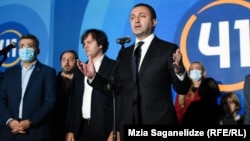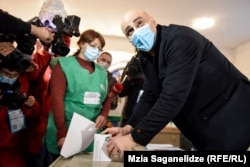With both government and opposition claiming victory, preliminary results from Georgia’s October 2 local elections appear unlikely to quell the emerging democracy’s sharp political divisions, with runoffs expected in mayoral races in five major metropolitan areas and 15 other towns nationwide.
The October 1 arrest and incarceration of ex-President Mikheil Saakashvili, deemed a fugitive from justice, was expected to deepen those divisions still further, but election day, according to observers, was largely peaceful and calm. As yet, Saakashvili’s former party, the United National Movement (UNM), the country’s largest opposition party, has not heeded his Facebook video appeal to take to the streets “to defend” their votes.
Based on preliminary official results, the ruling Georgian Dream received 46.68 percent of the vote in mayoral and local assembly elections nationwide -- a result well over the 43-percent finish that a scuttled deal with the opposition had stipulated would trigger early parliamentary elections. The UNM, who had deemed the election a “referendum” on the government, finished with 30.7 percent of the vote nationwide.
Runoffs in mayoral elections are expected in five major Georgian cities – Tbilisi, Batumi, Kutaisi, Rustavi, and Poti – and in 15 of 59 smaller municipal locations where no candidate received more than 50 percent of the vote. A second round of voting is scheduled for October 30.
In Tbilisi, incumbent Mayor Kakha Kaladze, the Georgian Dream's candidate, has an 11-percentage-point lead on the UNM candidate, party head Nika Melia (roughly 45 percent to 34 percent). Kaladze anticipates the Georgian Dream having 29 seats in the 50-seat Tbilisi City Council.
Candidates from the pro-Saakashvili UNM, however, are leading by slim margins of less than 2 percent in Batumi, Kutaisi, and Rustavi.
At an October 3 briefing, Prime Minister Irakli Gharibashvili declared that “our country and population” will win with the Georgian Dream in the election runoffs. “Today, we have ended the era of hatred and lies, and the era of peace, development, and stability should start tomorrow," he told supporters at an October 2 post-election Georgian Dream celebration.
In turn, the UNM has touted the number of mayoral-race runoffs, with Kutaisi mayoral candidate Khatia Dekanoidze asserting that Georgia’s large cities “have declared battle with the regime.“
Other opposition parties, though, posed no threat to the Georgian Dream. Former Prime Minister Giorgi Gakharia’s newly established For Georgia party finished a distant third with roughly 7.8 percent of the vote. Twelve other opposition parties received preliminary results no higher than 2.71 percent.
The UNM had actively urged voters to head to the polls, but the 52-percent turnout was four percentage points lower than for Georgia’s 2020 parliamentary elections.
Whether Saakashvili’s October 1 arrest had played any role in prompting Georgians to take part in the vote was unclear.
“I think that that is too hard for us to judge; it may have, it may have not” had an impact, said Michael Gahler, head of the European Parliament delegation to the Organization for Security and Cooperation in Europe’s Office for Democratic Institutions and Human Rights’ 380-member observer mission, in response to a question from RFE/RL’s Georgian Service. Gahler, however, commended the UNM urging “supporters to go to the vote and not, rather, to go to the streets.”
Nonetheless, the debate over whether the municipal elections were actually “a referendum on the government overshadowed, to a large extent, local issues,” objected observer David Eray from the Council of Europe’s Congress on Local and Regional Authorities, another part of the OSCE/ODIHR mission.
Controversy over Saakashvili’s imprisonment likely will continue that trend. Ukrainian President Volodymyr Zelenskiy has stated that he wants Saakashvili, a Ukrainian citizen, to be returned to Ukraine. The pro-Western, former Georgian leader, now on a hunger strike to protest what he considers a politically motivated sentence, has headed President Zelenskiy’s National Reforms Council since 2020.
Saakashvili was sentenced in absentia in 2018 to 3 years in prison for abuse of power in pardoning Interior Ministry officials involved in the 2006 death of banker Sandro Girgvliani and to 6 years in prison for allegedly organizing a 2005 physical attack on opposition parliamentarian Valeri Gelashvili.
Georgian President Salome Zurabishvili, who served as Saakashvili’s foreign minister between 2004 and 2005, has refused categorically to issue a pardon for her predecessor on these charges.
Prosecutors on October 3 may also charge Saakashvili with allegedly illegally crossing the Georgian border when he reentered Georgia ahead of the municipal elections, RFE/RL’s Georgian Service reports. Under Article 344 of Georgia’s Criminal Code, border violations are punishable with a fine or 3 to 5 years in prison.
The former president, who left Georgia in 2013 after nine years in power, also faces outstanding charges for a 2007 crackdown on protesters and subsequent takeover of the private TV station Imedi, and for the alleged misappropriation of public funds for private purposes.
From his prison cell, Saakashvili has no access to television and has been unable to follow the election, UNM member Eka Kherkheulidze told reporters after visiting the ex-president in Rustavi Penitentiary No. 12. On October 2, he released a handwritten letter in which he claimed his freedom and “the country’s freedom” depend on Georgian voters’ “activism” in the election and “ability to fight in the coming days.”
International and local election observers have made no mention of rampant vote fraud, but have all noted reports and instances of abuse of administrative resources by the Georgian Dream, voter intimidation, vote buying, carousel voting, violations of vote secrecy, obstruction of election observers, and physical attacks on opposition candidates.
A highly politically polarized media that pays scant attention to informing voters added to these concerns.
Despite the accusations from both sides, the OSCE/ODIHR mission found that responsibility for such divisions falls on both the government and the opposition. Commented the Council of Europe’s Eray: “It is high time for constructive political dialogue.”
The U.S. embassy in Tbilisi echoed these warnings, but went still further. The abuse of administrative resources, including pressure on public school teachers and law enforcement, is "deeply disturbing" and "wholly incompatible with Georgia’s democratic and Euro-Atlantic ideals," the embassy wrote in an October 4 statement.
Reports of such abuses raise "doubts about the overall fairness of the elections," it found.
Prime Minister Gharibashvili, however, has not yet acknowledged such problems. "The elections were held in a successful, peaceful, and free environment, and were positively assessed by international observers," he told an October 3 evening briefing.
--With reporting from Agenda.ge, Civil.ge, Interpressnews, Netgazeti, Reuters, and Tabula.ge







